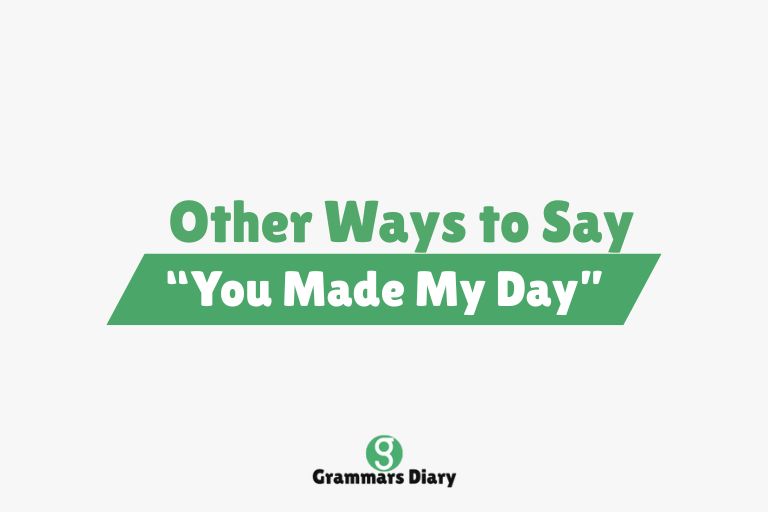The phrase “You made my day” is often used to express sincere appreciation when someone has brought you unexpected joy, relief, or encouragement. Whether it was a kind word, a thoughtful gesture, or a well-timed compliment, this phrase captures the warmth and gratitude we feel in such moments. For instance, if someone surprises you with your favorite coffee just when you needed it, saying, “You made my day” perfectly conveys your heartfelt reaction.
However, language offers a rich palette of expressions, and depending on the context, tone, or relationship, there are many other ways to communicate the same feeling of gratitude and emotional uplift. In this article, you’ll explore fifteen meaningful and expressive alternatives to “You made my day,” complete with examples and clear guidance on usage. Whether you’re writing a thank-you note, responding to a friend, or showing appreciation at work, these phrases will help you connect more deeply with your audience.
Other Ways to Say “You Made My Day”
1. That Really Brightened My Day
Example: “Your message really brightened my day after such a stressful morning.”
Meaning: This phrase expresses that someone’s action or words brought a moment of light or happiness to an otherwise dull or difficult time.
Usage: Best used in personal messages or conversations when expressing relief or unexpected joy.
2. I Truly Appreciate That
Example: “Thank you for staying late to help with the project—I truly appreciate that.”
Meaning: A sincere acknowledgment of someone’s help, support, or gesture that made a positive difference.
Usage: Ideal in both professional and informal settings, especially when formality or gratitude is emphasized.
3. That Meant the World to Me
Example: “You showing up for my performance meant the world to me.”
Meaning: Emphasizes that the gesture had deep emotional impact or personal importance.
Usage: Works well in heartfelt moments, especially among close friends or family members.
4. I Can’t Thank You Enough
Example: “I can’t thank you enough for your support during the meeting.”
Meaning: An expression of overwhelming gratitude when someone has exceeded expectations or helped significantly.
Usage: Suitable in both professional and emotional contexts to highlight strong appreciation.
5. That Was Exactly What I Needed
Example: “Your call came at the perfect time—exactly what I needed.”
Meaning: Implies that the action or gesture brought comfort, reassurance, or joy at the right moment.
Usage: Ideal when expressing relief, comfort, or well-timed support.
6. You Put a Smile on My Face
Example: “That little note you left really put a smile on my face today.”
Meaning: Communicates that someone’s small or thoughtful act caused genuine happiness or emotional warmth.
Usage: Often used in informal or friendly messages, especially when acknowledging gestures of kindness.
7. That Meant So Much
Example: “I know it was a small thing, but it meant so much to me.”
Meaning: Shows that a seemingly minor act held great emotional value.
Usage: Works well in emotional or appreciative exchanges, especially to emphasize significance beyond appearance.
8. You Really Lifted My Spirits
Example: “Thanks for your kind words—you really lifted my spirits today.”
Meaning: Expresses emotional rejuvenation or encouragement in a low moment.
Usage: Often used in times of stress or sadness to show how someone’s actions brought renewed positivity.
9. I’m So Grateful
Example: “I’m so grateful for everything you did to make the event successful.”
Meaning: A concise yet deeply heartfelt expression of thanks.
Usage: Universally acceptable in personal, professional, or written contexts when showing appreciation.
10. That Just Made Everything Better
Example: “Your joke really made everything better after such a rough meeting.”
Meaning: Acknowledges how someone’s action shifted the emotional atmosphere in a positive direction.
Usage: Works well in conversational tone, especially when talking about emotional recovery.
11. I Was Having a Rough Day Until That Happened
Example: “I was having a rough day until your kind words gave me hope.”
Meaning: A clear expression that someone’s gesture interrupted a negative experience and brought relief or joy.
Usage: Works well in storytelling or conversational responses, especially when emphasizing contrast in mood.
12. You Turned My Whole Day Around
Example: “Honestly, seeing your message turned my whole day around.”
Meaning: Expresses a complete shift in mood or outlook due to someone’s positive action.
Usage: Perfect for personal communication when a gesture makes a significant emotional impact.
13. I’ll Remember This All Day
Example: “That laugh we shared—I’ll remember this all day.”
Meaning: Communicates that the moment had lasting emotional value and will linger positively in memory.
Usage: Informal and expressive, often used when the moment stands out among the day’s events.
14. That Was So Thoughtful of You
Example: “You brought my favorite snack? That was so thoughtful of you.”
Meaning: Highlights the consideration and personal effort behind a gesture.
Usage: Appropriate in both formal and informal contexts, especially when acknowledging small acts of kindness.
15. I’m Still Smiling Because of You
Example: “I’m still smiling because of that kind message you sent earlier.”
Meaning: Shows that the joy or positivity from someone’s act continues to resonate.
Usage: Great for follow-up messages or expressions of ongoing gratitude.
When to Use Different “You Made My Day” Alternatives
In Professional Settings
In the workplace or during formal communication, using phrases like “I truly appreciate that,” “That was so thoughtful of you,” or “I can’t thank you enough” can help maintain a respectful tone while still expressing heartfelt gratitude. These expressions are effective in emails, performance reviews, or team feedback sessions where emotional tone should be professional but still warm.
In Everyday Conversations
For informal situations such as chatting with friends, loved ones, or coworkers, expressions like “You put a smile on my face,” “You really lifted my spirits,” or “That just made everything better” can convey genuine appreciation in a relaxed and relatable way. These phrases help foster emotional closeness and highlight small yet impactful moments.
In Messages and Notes
When writing thank-you cards, appreciation messages, or digital notes, slightly more reflective phrases such as “That meant the world to me” or “I’ll remember this all day” add personal depth and emotional resonance. These alternatives make your message feel more intimate and memorable.
Conclusion
While the phrase “You made my day” is a simple and beautiful way to show gratitude, having a variety of expressions at your disposal allows you to convey your emotions with nuance, sincerity, and context-appropriate tone. From heartfelt responses in everyday conversation to respectful appreciation in formal settings, these fifteen alternatives give you the flexibility to respond in a way that truly reflects how much the other person’s action meant to you. Expanding your vocabulary with such expressions not only strengthens communication but also deepens emotional connections with others.
If you’re someone who enjoys discovering new ways to articulate feelings and improve how you connect with others, keep exploring more synonym-rich guides like this one.
FAQs
What does “You made my day” mean?
It means someone did something that significantly improved your mood or brought you happiness, often unexpectedly.
Can I use “You made my day” in formal situations?
It’s best suited for casual or semi-formal conversations. In more formal settings, alternatives like “I truly appreciate that” or “That was very thoughtful of you” may be more appropriate.
Are these expressions interchangeable?
Most of them can be used interchangeably, but their tone and level of formality vary. Choosing the right one depends on your relationship with the listener and the context of your message.











